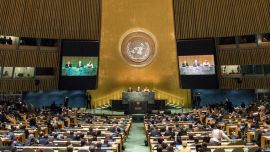Argentina's government has asked Interpol to arrest Iran's Interior Minister Ahmad Vahidi over the 1994 bombing of the AMIA Jewish community centre in Once, Buenos Aires that killed 85 people and left 300 injured, the Foreign Ministry said Tuesday.
Vahidi was reportedly part of an Iranian delegation currently visiting Pakistan and Sri Lanka, and Interpol has issued a red alert seeking his arrest at the request of Argentina, the portfolio headed by Diana Mondino said in a statement.
Argentina has also asked those two governments to arrest Vahidi, it added. Interpol's Central Bureau in Lyon has issued a Red Notice for his arrest, Noticias Argentinas reported on Tuesday night.
In parallel, Interpol's Buenos Aires bureau communicated with the its counterpart in Islamabad to request it proceed with an arrest with a view to extradition to Argentina.
While this is not the first time an arrest has been requested from Interpol in connection with the AMIA case, it is the first time it has occurred during President Javier Milei's government.
Vahidi is accused by the justice system of being one of the masterminds of the terrorist bombing. He allegedly participated in a meeting in 1993 in the Iranian city of Mahshad, where the decision was taken to carry out the attack in Buenos Aires.
However, Iran's official news agency IRNA reported that Vahidi was back in Iran on Tuesday, where he attended a ceremony to induct a provincial governor.
An official from Sri Lanka's Foreign Ministry told AFP that Vahidi was not listed as part of an Iranian delegation that arrived in the country on Wednesday.

Recent developments
On April 12 a court in Argentina placed blame on Iran for the 1994 attack against the AMIA Jewish community centre in Buenos Aires and for a bombing two years earlier against the Israeli Embassy, which killed 29 people.
The 1994 assault has never been claimed or solved, but Argentina and Israel have long suspected the Iran-backed group Hezbollah carried it out at Iran's request.
Prosecutors have charged top Iranian officials with ordering the attack, though Tehran has denied any involvement. No-one has been arrested in the case, which remains unsolved.
The court also implicated Hezbollah and called the attack against the AMIA community centre – the deadliest in Argentina's history – a "crime against humanity," placing them beyond the statute of limitations despite the passage of time and the lack of judicial results.
Tuesday's statement from the Foreign Ministry said: "Argentina seeks the international arrest of those responsible for the AMIA attack of 1994, which killed 85 people, and who remain in their positions with total impunity."
"One of them is Ahmad Vahidi, sought by Argentine justice as one of those responsible for the attack against AMIA," said the statement, which was co-signed by the Security Ministry.
Argentina has the largest Jewish community in Latin America, with some 300,000 members. It is also home to immigrant communities from the Middle East – from Syria and Lebanon in particular.
Former president Carlos Menem (1989-1999), who died in 2021 and was the president at the time of both attacks, was tried for covering up the AMIA bombing, but ultimately acquitted.
His former intelligence chief Hugo Anzorreguy was sentenced to four-and-a-half years in jail for his role in obstructing the probe.
Anzorreguy was among some dozen defendants who faced a slew of corruption and obstruction of justice charges in the case, including the former judge who led the investigation into the attack, Juan José Galeano, who in 2019 was jailed for six years for concealment and violation of evidence.
Recent developments
In their ruling this month the Argentine judges examined the geopolitical context at the time of the attacks and found they corresponded with foreign policy positions towards Iran under then-president Menem).
The attacks' "origin lies mainly in the unilateral decision of the government – motivated by a change in our country's foreign policy between late 1991 and mid-1992 – to cancel three contracts for the supply of nuclear equipment and technology concluded with Iran," the court concluded.
The judges put blame on Iran's then-president Ali Akbar Hashemi Bahramaie Rafsanjani, as well as other Iranian officials and Hezbollah members.
In 2006 Argentine courts requested the extradition of eight Iranians including Rafsanjani and Vahidi, who served as defence minister when Mahmud Ahmadinejad was president.
In 2013 then-president Cristina Fernández de Kirchner signed a Memorandum with Iran under which Argentine prosecutors could question the suspects outside Argentina.
The Jewish community in Argentina expressed outrage and accused Fernández de Kirchner of orchestrating a cover-up. The treaty never entered into force.
Alberto Nisman, a prosecutor tasked with investigating the AMIA bombing, opened an investigation in 2015 when Fernández de Kirchner was in the final year of her second term.
Just before he was due to testify before Congress, Nisman was found dead with a gunshot to the head. The cause of death – suicide or murder – remains a mystery. The justice system eventually dropped a probe against Fernández de Kirchner.
– TIMES/AFP/NA























Comments